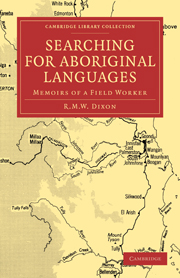Book contents
- Frontmatter
- Contents
- List of Illustrations
- Acknowledgments
- Map
- 1 Setting Off
- 2 “Haven't you got a machine?”
- 3 “You never talk it to me!”
- 4 Full of Unforgettable Characters
- 5 “Time to get back to wife”
- 6 “Drink this!”
- 7 “Of course we'll keep in touch”
- 8 “Doing all these Jalnguy”
- 9 Lots of Linguistic Expertise
- 10 “This way be bit more better”
- 11 “Happiness and fun”
- 12 “It's not”
- 13 “Those are good for you”
- 14 Loss
- 15 “I think I like that language best”
- Afterword
- Pronunciation of Aboriginal Words
- Tribal and Language Names
- Frontmatter
- Contents
- List of Illustrations
- Acknowledgments
- Map
- 1 Setting Off
- 2 “Haven't you got a machine?”
- 3 “You never talk it to me!”
- 4 Full of Unforgettable Characters
- 5 “Time to get back to wife”
- 6 “Drink this!”
- 7 “Of course we'll keep in touch”
- 8 “Doing all these Jalnguy”
- 9 Lots of Linguistic Expertise
- 10 “This way be bit more better”
- 11 “Happiness and fun”
- 12 “It's not”
- 13 “Those are good for you”
- 14 Loss
- 15 “I think I like that language best”
- Afterword
- Pronunciation of Aboriginal Words
- Tribal and Language Names
Summary
The plaster stayed on my left arm for almost three months, and it took that long before I was able to work at normal pace. Then I made a thorough assessment of Warrgamay. It had always seemed a bit too similar to Dyirbal to be truly interesting (in the way Yidiny was), and there was the perpetual struggle to separate out bits of Girramay. But suddenly, one day in November, things fell into place. Warrgamay doesn't have anything at all that could be called “tenses” – nothing referring simply to past, present or future time. Instead, it has a number of verbal endings marking “aspect”. A final -ma refers to something that might happen, purposive -lagu to something that should be done, -gi to something that is irretrievably finished. And then there is an unmarked aspect -y which must be used in circumstances other than those covered by -ma, -lagu or -gi (for instance, reference to present time); and -y can be used in place of any of the other inflections, if the speaker does not want to be too specific.
The materials on Warrgamay were rather slim, with just three short texts, and I could only produce a short sketch of the main grammatical features – perhaps a hundred pages, whereas my Dyirbal grammar had run to over four hundred.
- Type
- Chapter
- Information
- Searching for Aboriginal LanguagesMemoirs of a Field Worker, pp. 307 - 314Publisher: Cambridge University PressPrint publication year: 2011First published in: 1983



